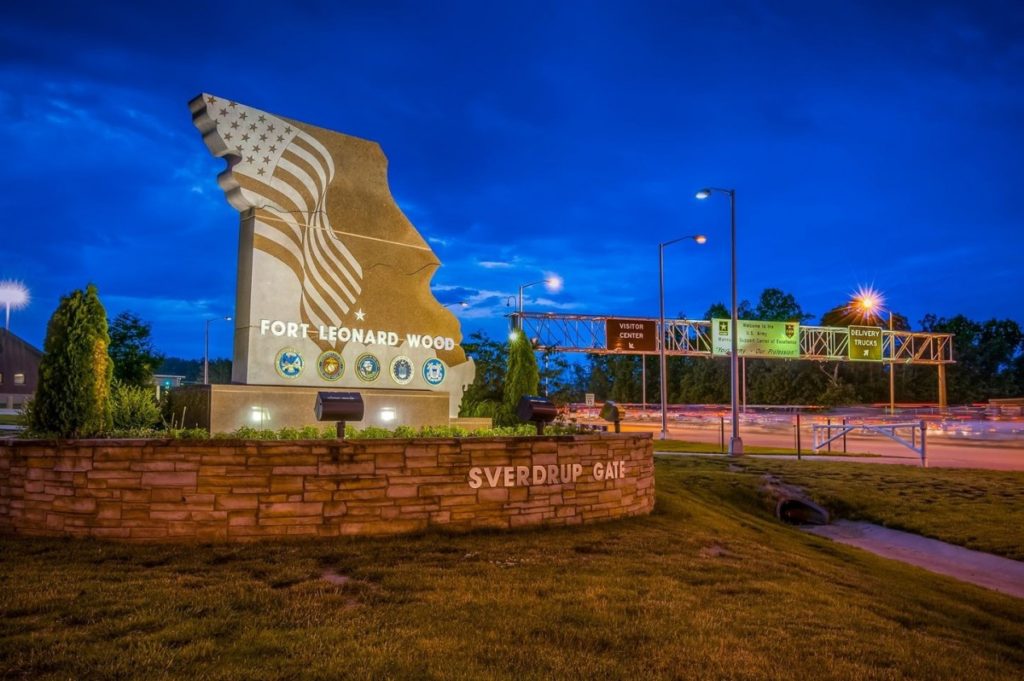By Sam Campbell
FORT LEONARD WOOD, Mo. (Jan. 24, 2019) — “I want to say we are competitive,” retired Col. Charles Williams said, sitting in front of enough Junior Reserve Officer Training Corps competition trophies to smelt into a statue.
Williams, who commissioned through Officer Candidate School and previously served as Fort Leonard Wood’s garrison commander, now supervises cadets as the Waynesville JROTC senior Army instructor.
The program travels frequently to compete in drill meets with schools from other counties and states. Cadets under Williams’ direction practice every day after school, except Fridays, and for about eight hours per week, he said.
After assuming his current position in November 2012, he injected into the program the same level of professional intensity that came with his prior duties.
“(Some) high school kids have a ‘passing is good enough’ (mindset), which doesn’t work in the military,” he said. “I’m not interested in having a ‘good enough’ program.”
Although the adherence to strict schedules and rigorous academic requirements make it a different kind of environment from most public schools, Williams’ experience as an officer at the nation’s oldest military academy trained him for the job he would take years later.
“I spent a lot of time (at West Point) talking to cadets about academics, because at the end of the day, if they can’t make it academically, they’re not going to stay there,” he said.
The same can be said for Waynesville.
“Our main focus here is the most important thing (cadets) can do in high school — get a high GPA, which generally translates into a high ACT score,” he said. Military scholarships are solely based on those academic factors, he continued.
Williams is well-aware of the attention he paid to detail while in school.
“It’s hard to put your finger on why I am the way I am, but when I was in college, if I got one question wrong on the test, I’d want to argue it,” he said.
His hardline demeanor is balanced by his realization that though JROTC is funded by the Army, it is a citizenship program.
“(Cadets) learn how to march and do things like that, but it’s probably less military than people think,” he said.
Beginning this position just 20 days after retirement presented a personal challenge. It turns out that high school is quite different from the military.
“It’s kind of shocking sometimes when you get here because you come out of the Army thinking you’re (still in), and this isn’t the Army,” Williams said.
“When you’re a colonel, everybody stands up when you walk in the room and nobody talks when you’re talking,” he continued.
“When you walk into a high school classroom, they don’t give a crap — they’re like, ‘Hey, what’s up, dude?’”
Williams takes it in stride. “They make me laugh every day,” he said.
“It’s interesting watching them grow up,” he continued. “They’ll get their pants hemmed this week and a month from now their pants are at their knees.”
Cadet Capt. Tyler Masters, a senior at Waynesville High School, has studied under Williams for two years.
“He is a fun guy who teaches through humor and sarcasm,” Masters said. “(He taught us) it’s okay to have fun, as long as you’re serious when you need to be.”
The camaraderie among peers is noteworthy.
“It’s the same kids for four years,” Williams said. “They get very close because they travel and spend a lot of time together.” He has seen students shed tears upon parting at graduation and the end of the school year.
Preparing seniors for life after graduation is one of Williams’ primary goals. “I try to make sure by the time they are a senior, that when they walk across the stage, they have a plan,” he said.
Williams has senior cadets assemble portfolios of all their achievements so they can use it in applying for scholarships, Masters said. “It really helps us get to where we want to go.”
The retired colonel’s own plan to instill uniform professionalism into the program has paid off. Last year, 10 graduating seniors received ROTC scholarships.




